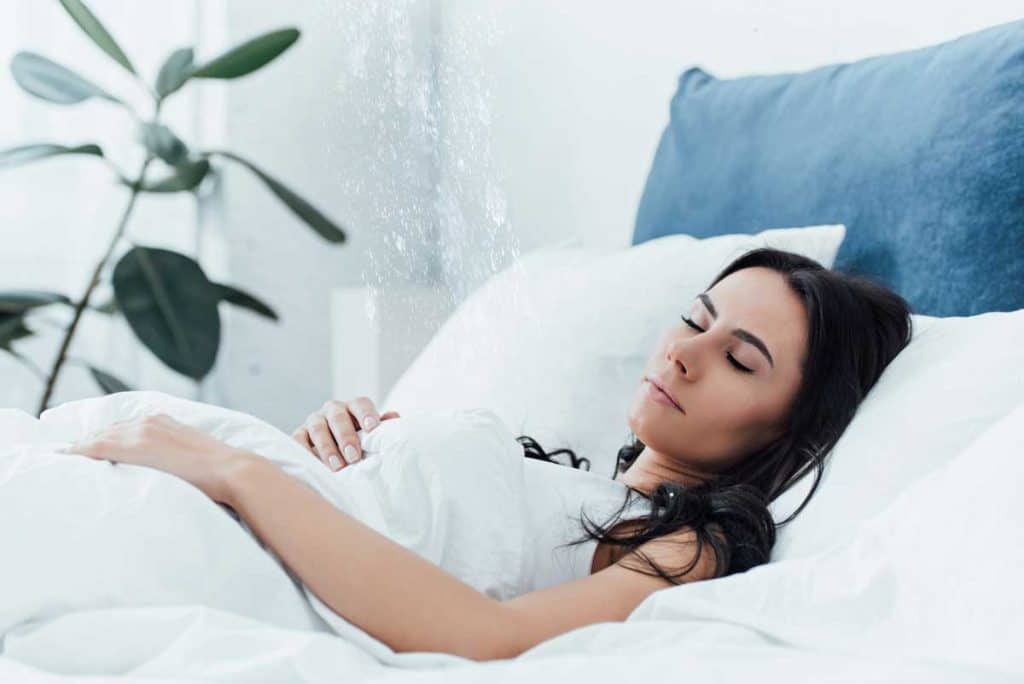
We’ve heard that water can make us function better to carry out our daily tasks. Drinking water can help us lose weight, concentrate at work, and beat fatigue. But it seems like a lot of Aussies don’t drink enough H2O according to research.
Sunshine Coast Daily reported about 80 percent of Australians suffering from dehydration. A huge chunk of the population experiences symptoms like lethargy and poor mental concentration.
Studies show that dehydration can make you feel sluggish, famished, and irritated. But did you know it can throw off a good night’s sleep also? Here’s how a glass of water can improve your nighttime rest.

How can dehydration affect sleep
Wondering how drinking water can say about your sleep? A lot of people raised nighttime dehydration can disturb your shuteye by hosting a lot of sleep problems.
Snoring and sleep apnea. Not drinking enough water can dry your nasal passages which lead to extensive snoring at night. Meanwhile, dehydration and sleep apnea have a reciprocal relationship. Dehydration is common among sleep apnea patients because it consumes more oxygen and water.
Leg cramps. The more you are dehydrated, the more you lose electrolytes which can make your muscles cramp at night. Electrolytes are nutrients such as sodium, calcium, and potassium found in your body fluids. They are needed to maintain healthy muscle function, including growth and repair.
Decreased mental functions. Expect to have brain fog the next day if you did not drink enough water before bedtime. Some individuals expressed having headaches before lying down to doze off. This further causes insomnia and delays sleep at night.
High blood pressure. Low H2O pressure leads to high blood pressure because your blood vessels pump harder. It can also lead to trouble in falling asleep due to insomnia.
Restless: thirsty and hungry. Extreme thirst can make you feel restless at night and get up to eat or pace around the room. Not only this disturbs your sleep, but it can cause stress and weight gain on your part as well.

What about drinking too much water before bedtime?
Drinking too close to sleep will lead to other problems at night. In some instances, you can have nocturia, a condition where one has an uncontrollable urge to get up and pee. While it’s common among seniors and people with bladder issues, lifestyle choices like drinking water right before you sleep can trigger nocturia.
And while this may seem uncommon, the idea of water poisoning is also probable. If you drink too much water during the day, it can further lead to issues like fatigue, brain fog, headache, diarrhea, and vomiting. Severe cases may lead to brain damage and seizures.
Water-binge drinking can lower your sodium levels in your blood and can be fatal to some people. It’s best to drink water regularly at equal intervals throughout the day.
When to drink water and how much?
Drinking eight glasses of water a day is debunked by researchers as it proves no medical value over a person. The exact amount of water one should take depends on a myriad of factors like body size, drinking level, activity, condition, and more.
To know how much water you should take, drink enough that your pee is almost clear or at least very light yellow. Drink at even and regular intervals. The best times to drink water are:
- Upon waking up. This allows your body to fully wake up to start the day.
- Drink before a meal. This helps your stomach ease itself before chow time. What’s more, it’ll make you feel fuller and less likely to gobble so much food.
- Together and after meals. It’ll allow better digestion in the stomach.
- When you’re hungry. Sometimes, people mistook thirst as hunger. Most of them, they’re just dehydrated.
- Drink before and after a workout. Drinking before a workout can help regulate the muscles when you hit it hard in the gym. What’s more, drinking after your exercise can replenish lost electrolytes.
- Drink when you’re sick or tired. You get dehydrated easily when you’re running hot on a fever. Drinking water can help you retain your energy.
In general, you should drink water two hours before bedtime. You can cut alcohol and caffeine at least four hours before you hit the hay.



